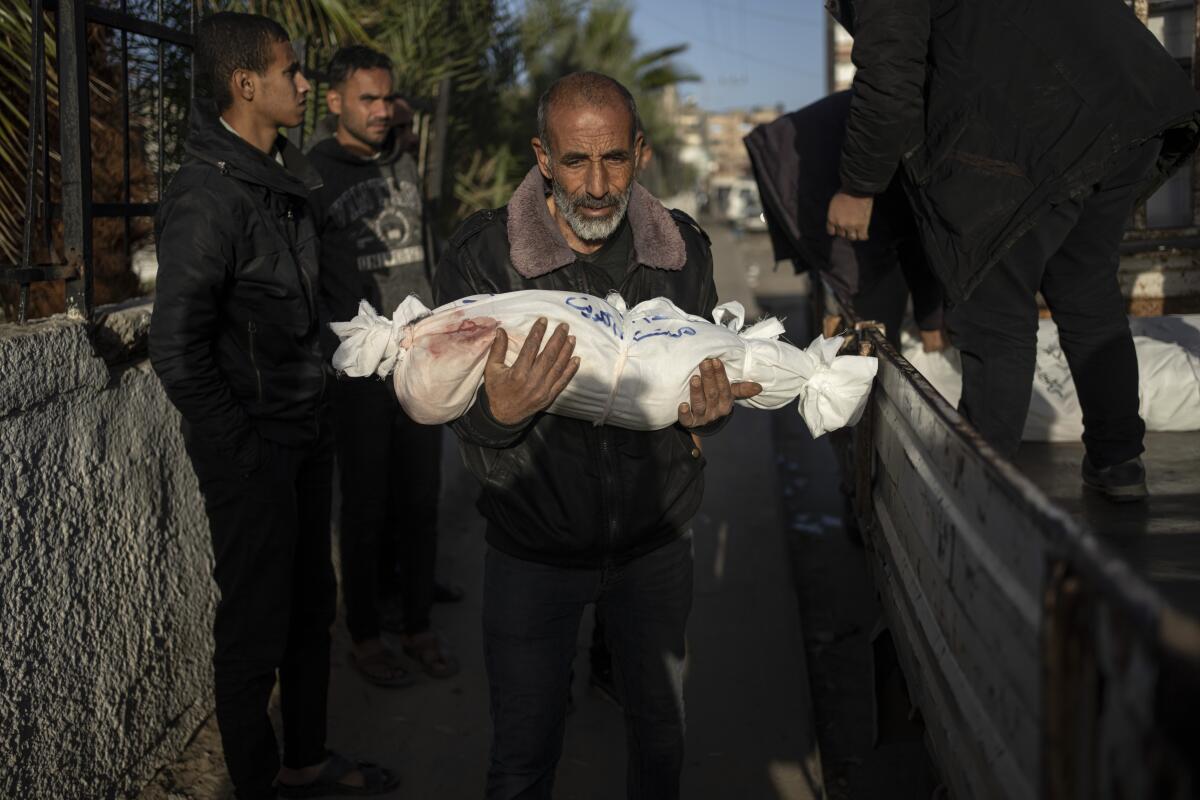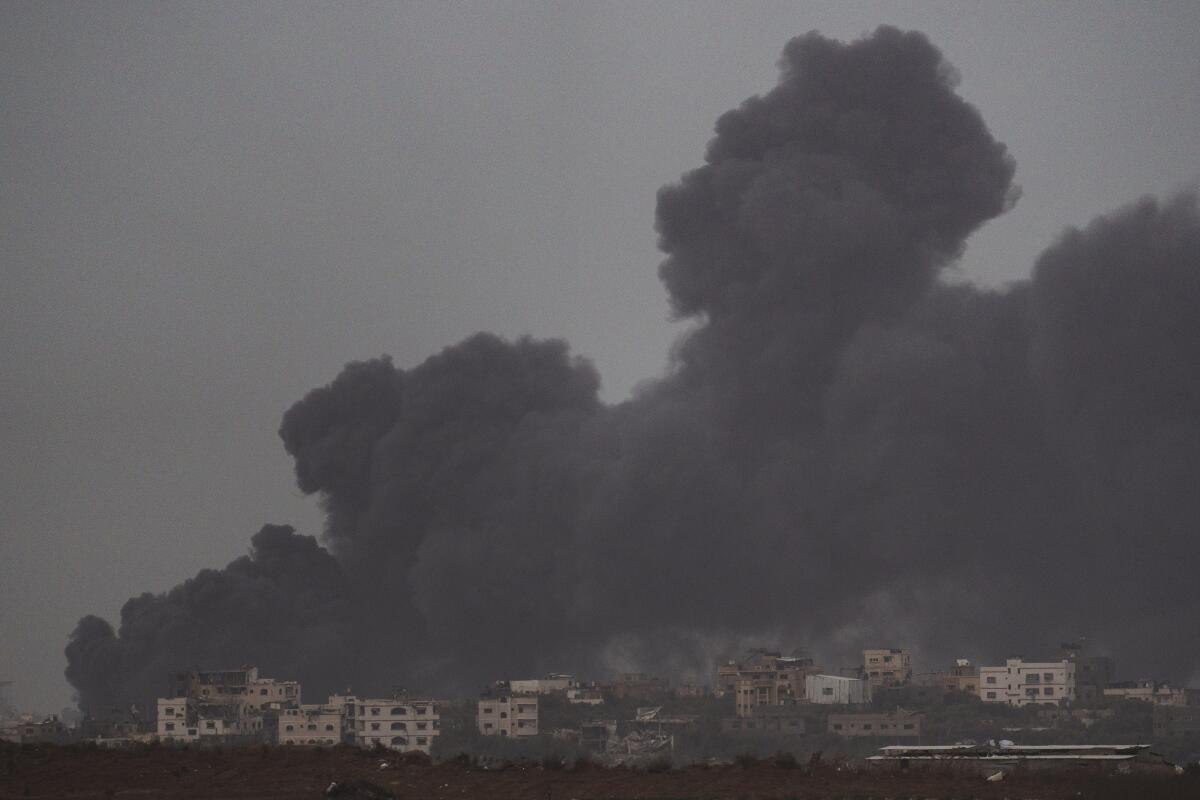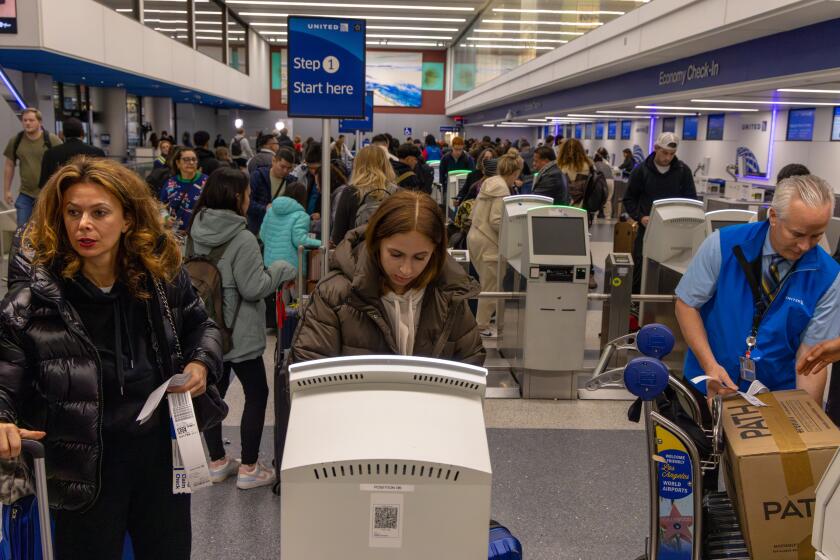Hopes dim for cease-fire as Israel vows to continue war

- Share via
TEL AVIV — The death toll in Gaza grows by the hour. International pressure on Israeli Prime Minister Benjamin Netanyahu steadily increases. And ordinary Israelis voice more and more frustration over the direction of the deadliest war yet against the Palestinian militant group Hamas.
Yet as the year winds down, it’s unclear whether the combination of factors will force even a temporary hiatus in fighting that is exacting a vast human cost, eroding U.S. support around the world and threatening to influence American elections next fall.
The death toll in Gaza, exacerbated by one of the most intensive bombing campaigns in the history of modern warfare, reached a bleak milestone Friday, surpassing 20,000. The United Nations has said about two-thirds of the Palestinians killed were women and children.

Israel launched its bloody campaign to eliminate Hamas after the militant group launched a cross-border attack Oct. 7 in which it killed at least 1,200 people, mainly civilians, and took about 240 hostages, many of whom remain captive in Gaza.
In the latest show of resistance to U.S. calls to stem civilian casualties, Netanyahu told President Biden in a phone call Saturday that Israel would “continue the war until all its objectives are met,” the prime minister’s office said.
Netanyahu also sought to portray as a show of solidarity what was widely read as a rare public U.S. rebuke of Israel: the Biden administration’s decision Friday not to veto a U.N. Security Council resolution that demanded more aid be allowed into Gaza.
Coronavirus transmission is once again spiking in California entering the winter holiday season — and the new JN.1 subvariant may be partly to blame.
The prime minister’s office said after the phone call that Netanyahu had “expressed his appreciation” for the U.S. stance on the resolution, which stopped short of demanding a cease-fire while calling for “unhindered” humanitarian aid for Gaza. Biden, in brief comments outside the White House, was more taciturn, saying he’d had a “private” conversation with the Israeli leader and did not request a cease-fire.
The Security Council resolution passed after days of negotiations in which the U.S. fought to water down the language so that it did not contain a call for a cease-fire.
Staunch backing of Israel by the Biden administration has softened slightly as urgent appeals for a cessation of hostilities have grown domestically, including among Biden’s Democratic base 11 months ahead of a tight presidential election, and among numerous U.S. allies.
Aid organizations welcomed Friday’s U.N. resolution but said it fell woefully short of the needs. Hundreds of thousands of Gazans displaced by Israel’s military onslaught are living without sufficient food or water, amid squalor and disease.
Failure to demand a cease-fire, the International Rescue Committee said, is “unjustifiable.”
“We reiterate that the only way fully to protect Palestinian lives, enable a sufficient humanitarian response and offer the best chance of hostage release is to stop to the fighting,” the IRC said, echoing numerous other groups.
In the vote Friday, the U.S. reversed its opposition to a series of similar resolutions, agreeing to abstain.
Before that vote, the U.S. had stood alone in vetoing measures that called for a cease-fire and did not condemn the Oct. 7 Hamas attack. The Biden administration, along with Israel, has argued that a cease-fire now, which would leave Hamas leadership in place, would allow the militant organization to regroup and rearm.
“Today, this council provided a glimmer of hope among a sea of unimaginable suffering,” the U.S. ambassador to the U.N., Linda Thomas-Greenfield, said when the measure was approved Friday. “Today, this council called for urgent steps to immediately allow safe, unhindered and expanded humanitarian access and to create the conditions for a sustainable cessation of hostilities.”
Other Security Council members were angry that the U.S. could not be persuaded to go further.
The closest previous example of the U.S. not siding with Israel at the U.N. came in the waning days of the Obama administration, when then-U.N. ambassador Samantha Power cast a first-ever abstention allowing approval of a Security Council resolution declaring Jewish settlements in the West Bank illegal. Though that resolution was in keeping with international law and had been U.S. policy for decades, the action drew anger from the Israeli government and some Republicans, including incoming President Trump.
Today, however, demands for even a temporary cease-fire have not been accepted.
A month has elapsed since the start of the last temporary truce. That week-long pause in fighting saw more than 100 hostages who were seized inside Israel freed in exchange for about three times as many Palestinian prisoners. But with more than 100 hostages still held in Gaza, efforts to broker another swap have faltered; Hamas recently rejected an Israeli offer to again temporarily halt fighting if more hostages were released.
Families of those held captive are pressing their cease-fire demands with greater desperation. On Saturday, a rainy, windy night in Tel Aviv, thousands of relatives and their supporters huddled under umbrellas, calling for the government to find a way to free their loved ones.
“We will not stop until everyone returns,” said attendee Sivan Cohen Saban. “All of them, all of them.”
For Israel, the hostage crisis remains an open wound. The accidental fatal shooting Dec. 15 by Israeli troops of three hostages inside Gaza set off an international uproar that has yet to die down. The Israeli military said the soldiers involved violated rules of engagement and would be disciplined.
The three slain hostages, all in their 20s, had dramatically sought to signal their presence to Israeli troops, emerging shirtless and waving a makeshift flag. They had even managed to scrawl a message in Hebrew on the wall of a building, trying to alert the army to their presence.
In what has become a grim recurring ritual, Israel continues to identify those killed in the Oct. 7 Hamas-led massacres or who have died since in captivity.
The latest disclosed death was that of a 73-year-old dual citizen of Israel and the United States, Gadi Haggai. He was killed in the attack on his kibbutz in southern Israel, but militants took his body into Gaza and are still holding it, Israeli officials said Friday.
On the Palestinian side, about 300 U.S. citizens, holders of green cards or their close relatives remain trapped inside Gaza, the State Department has said, and frantic relatives continue to press to get them out.
Israel’s armed forces insist they are continuing to degrade Hamas militarily, but 11 weeks into the war, the oft-repeated goal of destroying the group’s capabilities seems far away. Although the Israeli army has claimed to have killed a number of the group’s senior commanders and has seized and razed at least one home belonging to Hamas chief Yahya Sinwar, he appears to remain at large and unscathed.
In Israel, the conflict has created a political paradox: Surveys suggest most Israelis still support the war but do not trust Netanyahu as a wartime leader. Many harbor doubts about whether his stated aim of crushing Hamas is achievable or question whether he will prioritize bringing captives home.
Meanwhile, warnings are growing louder that Israel may miss out on a chance to free the hostages through a deal with Hamas if it continues to ignore international pressure for either a temporary truce or a longer-term halt to the fighting.
“It’s decision time,” former Prime Minister Ehud Olmert wrote in an opinion piece last week in the Israeli newspaper Haaretz. “A cease-fire with living hostages, or a forced cessation of hostilities with dead ones.”
Times staff writer King reported from Tel Aviv, and Wilkinson from Washington.
More to Read
Get the L.A. Times Politics newsletter
Deeply reported insights into legislation, politics and policy from Sacramento, Washington and beyond. In your inbox twice per week.
You may occasionally receive promotional content from the Los Angeles Times.












